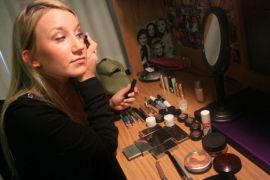Sophomore Jessica Carp lists designer names such as Chanel, MAC, Bobbi Brown, Benefit and NARS as her favorite cosmetic brands. But when it comes to mascara, she buys exclusively from drugstores.

“I tried a couple of mascaras from department stores, but none of them worked for me, so I just started going for the drugstore kind,” she said.
Right now, her favorite is Intense-XXL from Maybelline, a mascara that coats eyelashes with a white basecoat and a black topcoat.
In November 2008, The New York Times reported cosmetic sales were up 40 percent. This jump is consistent with the Lipstick Index, a concept originated by Estée Lauder’s Leonard Lauder, that says cosmetic sales rise when finances fall.
As the industry grows, high-end cosmetic brands continue to make promises about their products and for the most part they do deliver, said Holly Siegel, the beauty director of NYLON magazine. But Siegel said shoppers shouldn’t buy into the designer makeup hype too quickly before looking into less expensive counterparts.
“A lot of people don’t know that the research and development of a drugstore product is actually quite extensive,” she said.
The low-cost variable, combined with the need to suit many different skin types, means every product available in a drugstore is the result of intensive testing.
Since high-end products are often designed to suit specific skin types or complexions, less product development is required for those products than their inexpensive counterparts. Siegel said in terms of their basic ingredients, most beauty products are essentially created equal.
“The biggest difference between a designer eye shadow and a drugstore one is usually that the designer one is more finely milled, so it’ll crease less,” Siegel said. “Other than that, it’s the same ingredients, the same pigments and pretty much the same product.”
She said doing a little product research goes a long way when deciding to spend or splurge. For example, Lancôme’s Juicy Tubes lip gloss costs approximately $14 at the makeup counter and L’Oréal Paris’ Color Juice lip gloss goes for half as much at the drugstore. Both produce the same effect, have almost identical ingredient lists and are made by the exact same company, since the Lancôme brand is owned by L’Oréal Paris.
“The educated shopper should be able to find what they like at a drugstore,” Siegel said. “Things like blush, mascara, eye shadow, lip gloss and nail polish are just a few of the things you can buy for a lot less without compromising on quality.”
Though the promise of a similar product for less is tempting, sophomore Joanna Cook said she is still skeptical. Cook purchases “fun stuff,” such as bright eye shadow and flashy lip gloss, at a drugstore but buys the basics (concealer, blush and eyeliner) from makeup counters.
“If I’m paying that much more for makeup at a department store, there has to be a reason why,” she said.
But a higher price tag doesn’t necessarily mean higher quality, Siegel said.
“What you’re really paying the most for is the great packaging, the customer assistance, the atmosphere of the store and, of course, the brand name,” she said.
Many high-end cosmetic companies carefully design packaging to give each line a distinct “look” and create a visual appeal for customers. But Siegel said the aim of drugstore brands such as Revlon, Covergirl and Maybelline to create the best products for the best prices often means “cutting corners on sexy packaging or sexy ingredients.”
In certain cases, buying from a department store makeup counter may be the best option. Those with specific skin care needs or anti-aging concerns will likely benefit from the overall potency of high-end products, Siegel said.
Still, high-quality foundation and moisturizers can come at drugstore prices. Dr. Kimberly Silvers, a dermatologist at Ithaca Dermatology, often recommends Neutrogena and Olay products to her patients. She said it isn’t necessary to spend much on skin care because designer brands tend to mark up prices considerably in order to cover expensive packaging and marketing.
“Products from these brands [such as Neutrogena and Olay] are usually developed in part by dermatologists,” Silvers said. “Over the past decade these brands been able to refine and develop ingredients to make them more effective and more affordable.”
Ingredients aside, department store cosmetics counters have an edge over drugstore makeup aisles in that products are on display for potential buyers to test.
Sophomore Leighann McGlone spent last summer working as a sales associate for Clinique, a popular brand with a focus on skin care, at a Macy’s department store outside of Albany, N.Y. To her, paying extra for designer makeup is justified by the customer service shoppers receive.
“When you’re in CVS, you’re kind of just winging it because you can’t open it up to see how it looks on your skin,” McGlone said. “There’s also no one there to help you, or to tell you more about the product, or to show you how it works.”
At a time when many students are cutting luxury items out of their budgets, makeup aficionados shouldn’t stress about skimping on quality cosmetics. As it turns out, a little research can go a long way. By making some compromises between high-end and drugstore items, students can make sure their makeup bags don’t suffer.




